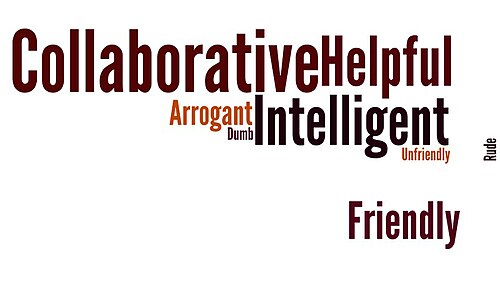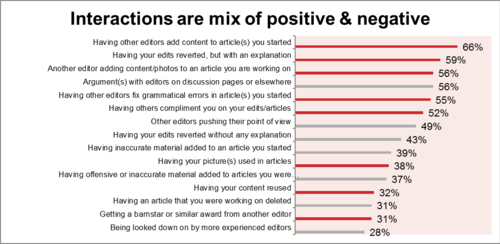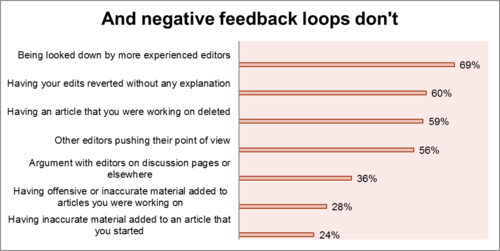Editor Survey 2011/Wikipedia Community
SECTION 4: WIKIPEDIA COMMUNITY: POSITIVE ASSESSMENT OF EACH OTHER[edit]
As stated earlier, we have found that the number of active editors has been stagnant and even declined in English Wikipedia. It has been hypothesized that acrimony and rancor among community members is driving editors away from Wikipedia. Although the Wikipedia community is not perfectly harmonious, the data clearly shows that editors primarily do have a positive assessment of each other. Interactions with other editors are a mix of positive and negative, with a slight bend towards positive. More important, positive interactions – like awarding barnstars or adding content to another editor’s article – make editors want to edit Wikipedia more.
Although much has been posited about reverts and their role in declining participation in Wikipedia, the survey research shows that most editors believe reverts with explanation don’t decrease their likelihood of editing in the future, though the same does not hold true for reverts without an explanation.
4.1 Positive assessment of fellow editors[edit]
When asked to pick two words that describe fellow editors, the majority of editors selected positive adjectives in favor of negative adjectives. A full 48% of editors described other editors as collaborative, 38% as intelligent, 35% as helpful, and 31% as friendly. But 24% described fellow editors as arrogant. A small minority even described fellow editors as rude (8%) and dumb (5%).

4.2 Interactions with other editors are a mix of positive & negative, with positive outweighing negative by a thin margin.[edit]
Two-thirds of editors surveyed reported that other editors added content to articles they'd started. Regarding reverts, more editors reported their edits were reverted with an explanation, at 59%, in comparison to 43% who said that their edits were reverted without any explanation. An equal number of editors (56%) reported that another editor had added content/photos to their work, as those who reported arguing with fellow editors. On the positive side, 15% pointed out that their article was selected as a feature article, and 21% said that their article made it to the front page. However, 28% also believed they were looked down upon by experienced editors. An equal number reported receiving a barnstar as those who initiated an article that was ultimately deleted (31%). Since interactions are key to establishing the likelihood of editing in the future, it is important to ensure that more interactions on Wikipedia among editors are positive than negative.

4.3 Positive reinforcement works[edit]
A majority of editors pointed out that positive interactions – like receiving compliments and Barnstars from fellow editors – and positive experiences – like an article making it to the front page – made them more likely to edit Wikipedia. 78% of those editors who received compliments from other Wikipedians said that such interaction increased their likelihood to edit. Similarly, other positive interactions that increased the likelihood of editing include: having an article selected as a feature article (76%); having an article make the front page (72%); having a self-provided picture used in an article (71%); receiving a Barnstar.(70%).


While positive interactions work, negative interactions reduce the likelihood of editing. 69% of editors who believed that other editors looked down on them said the feeling decreased their likelihood to edit. Similarly, 60% of those whose edits had been reverted without an explanation and 59% of those whose articles had been deleted, pointed out that such feedback decreased their likelihood to edit.
4.4 Reverts don’t hurt as much if there is an explanation for reversal[edit]
60% of editors whose edits had been reverted without any explanation said that this made them less likely to edit, while only 9% of editors whose edits had been reverted with explanation felt less inclined to edit. An overwhelming majority of editors, 83%, believe feedback from other editors has helped better their own skills, in comparison to only 17% who said that feedback from other editors through reverts, discussions, etc. has been a bad experience.
4.5 24% reported being harassed by other editors on Wikipedia[edit]
24% of editors in the survey said other editors on Wikipedia had harassed them, while 5% reported being harassed outside of Wikipedia (via phone calls, Facebook, through other websites, etc.). We did not find any statistical differences based on gender, although older editors are more likely to point out that they have been harassed. It is interesting to note that despite almost a quarter of editors claiming harassment and other negative experiences in Wikipedia, most editors provided a positive assessment of the community.

4.6 The Wikipedia Editor Satisfaction Index[edit]
To better quantify the Wikipedia editors’ experiences, we defined the Wikipedia Editor Satisfaction Index (WESI) using their responses to two questions in the survey. Firstly, we looked at the two words editors chose to describe the fellow editing community (Q17). Secondly, we tried to incorporate their perception of the usefulness of the feedback they receive from the community (Q20).
Next, we assigned weights to their responses: for Q17, each positive adjective used to describe a fellow editor (Collaborative, Intelligent, Helpful, and Friendly) was assigned a +1, and each negative adjective (Arrogant, Unfriendly, Rude and Dumb) was assigned a -1. Q20 asked editors to choose one of the two statements – whether feedback through other editors had helped them become a better editor or not; this was weighted at +2 for a positive response (The feedback from other editors through reverts, discussions, etc. has helped me become a better editor) and -2 for a negative response (The feedback from other editors through reverts, discussions, etc. has been a bad experience for me). The resulting range of scores was -4 to +4. While preserving the ratio of differences, we normalized the range to a 10-point scale, which would be easier to interpret.

The overall distribution of scores was definitely positive, with an average WESI score of 7.65 across all respondents, out of a maximum score of 10. In fact, as many as 47% of the respondents scored a perfect 10 on the WESI. This means that most of the editing community is very satisfied with their experiences on Wikipedia – and holds the community in a positive light. Next, we wanted to understand how specific interactions shaped an editor’s experience. This required analyzing the effect of each of the 17 interactions/experiences listed in Q18 on the WESI score. Also, we wanted to understand how these scores vary across different demographics. Hence, we included age (D1b), number of edits (D2_1), education (D3a) and gender.
We performed a linear regression on the WESI score with a set of independent variables.
KEY FINDINGS[edit]
1. Editors really appreciate help: Having another editor add content in the form of text and/or photos has a positive effect on the editor’s overall satisfaction. This is true both for articles they created, and articles they might have added to. Editors who received contributions from their peers on articles they started were much more likely to have high WESI scores. The seemingly insignificant task of editing and fixing grammatical errors is also greatly appreciated by fellow editors.
2. Peer Recognition is important, and much more important than other forms of recognition: Barnstars and rewards from fellow editors are very important to the community. Receiving compliments is another motivator. Editors value the appreciation of their peers much more than other perceived achievements, such as having their articles selected as featured articles, or making it to the front page.
3. When edits are reverted or deleted, an explanation is key: When an edit is reverted, some sort of explanation to the cause is important to editors. There is a high significance associated with both the presence and absence of an explanation. Editors who receive an explanation are likely to be more satisfied overall. Also, not receiving an explanation has a strong negative impact on an editor’s experience on Wikipedia.
4. Unpleasant interactions with community members affect satisfaction; otherwise, editors are rather resilient: Experiences such as having articles deleted, arguing with other editors, having other editors push their view, and being looked down upon by more experienced editors all have a significant negative impact on the WESI score. On the other hand, having inaccurate and/or offensive material added to articles they started and/or worked on did not affect their experiences much.
5. Women are less satisfied with the community: In general, women scored lower on the WESI, and hence their interactions with the community are less pleasant.
6. Editors with more advanced degrees are less satisfied compared to those with lesser education: Editors that hold Master’s or more advanced degrees score lower on the WESI compared to those with Bachelor’s degrees. Similarly, those with A-levels or lower level of education are more satisfied with the community, and are also the most satisfied of the lot. For more detailed results, please see Appendix B.
